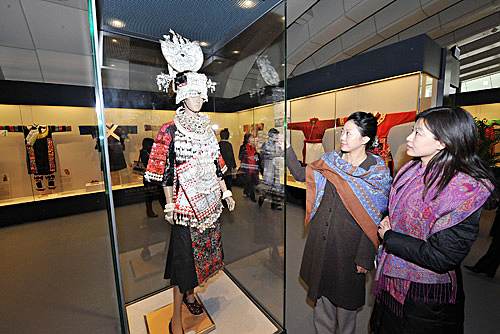|
 |
|
GLITTERING COSTUME: Visitors to China's Women and Children's Museum look at women's outfits from a Chinese ethnic group. The museum, which opened on January 10, 2010, is the first that explores social changes in the lives of women and children (HE JUNCHANG) |
Monitoring Families
The Communist Party of China (CPC) on January 13 pledged to strengthen its anti-corruption efforts by strengthening the Party officials' family reporting regulation.
Party organs at all levels are to carefully administer the family reporting regulation to prevent officials from abusing power, taking bribes and participating in other illegal activities, according to a communiqué issued by a plenary session of the CPC's 17th Central Commission for Discipline Inspection (CCDI).
The CPC promulgated the family reporting regulation in 2006, whereby Party officials are obliged to report information such as their spouses' and children's' employment, real estate and investment.
The communiqué issued on January 13 added that the disciplinary organs would strengthen their management of those Party and government officials whose spouses and children have emigrated.
From January to November 2009, 106,626 officials across China were penalized for disciplinary violations, the CCDI announced on January 7.
Snowstorm Relief
Chinese authorities have begun to deploy disaster relief teams to regions hit by heavy snowstorms, the civil affairs ministry said on January 13.
The ministry and the National Disaster Reduction Commission began the level-IV national disaster emergency response to assist local relief work, as heavy snows and cold weather continue to grip the northern regions.
Across 12 regions including Beijing, Inner Mongolia and northwestern Xinjiang Uygur Autonomous Region, 4.67 million people have been affected, six have died and 13,000 have been relocated.
The storms destroyed 4,000 homes and damaged another 27,000, causing economic losses estimated at 1.4 billion yuan ($205 million).
The Ministry of Civil Affairs has so far sent 7,000 tents, 40,000 cotton-padded quilts and coats to the storm-hit regions.
Prisoners' Care
China's ministries of public security and health have ordered detention houses, prisons, drug rehabilitation centers and hospitals to improve medical care for detainees and convicts.
The ministries said in a notice that detention facilities should have in-house nurses, doctors and practitioner pharmacists, if possible, according to a statement on the Ministry of Public Security website.
Detention facilities with insufficient in-house doctors should seek assistance from hospitals for daily medical requirements, the notice said.
Avoid Traveling
China's Ministry of Health in January advised people in vulnerable groups to stay home for the upcoming Spring Festival in a bid to prevent an A/H1N1 outbreak.
A large number of Chinese people, mostly migrant workers and students, usually travel back home for family reunions during the Lunar New Year, which falls on February 14 this year, resulting in large numbers using mass transportation.
Pregnant women, children, the elderly and those with chronic diseases have been advised not to go into crowded places and to see doctors as soon as possible if they experience respiratory symptoms, the ministry said.
Mr. Right Anxiety
About 41 percent of single Chinese women are worried that they might not find a good match, according to a recent survey.
The figure was almost five times lower in men as only 8 percent of single males admitted to the same worry. The survey was completed over three years and attracted more than 2 million respondents.
The survey also said that some 40 percent of women admitted they had high expectations for their future husbands. Forty-four percent, however, said they would not lower their standards just to get married. | 